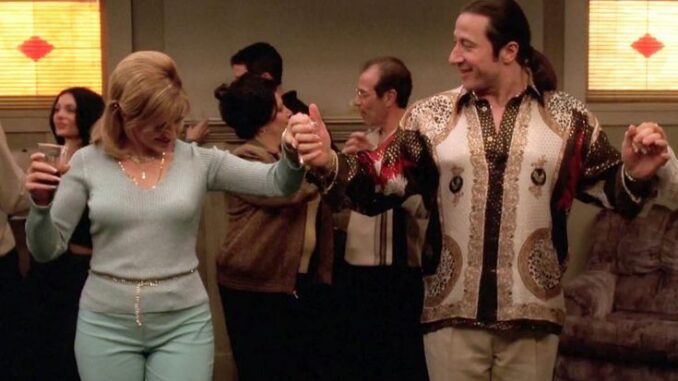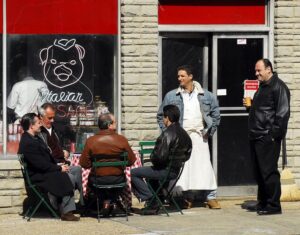
The Sopranos Offered a Dark Distortion of the American Dream
When you think of the American Dream, you likely picture success, wealth, and the pursuit of happiness. But what if that dream isn’t everything it’s cracked up to be? What if the very foundation of that dream is built on lies, corruption, and broken promises? That’s where The Sopranos comes in — the groundbreaking TV series that gave us a brutally honest portrayal of the American dream gone wrong.
Through the eyes of Tony Soprano, a mob boss trying to balance family life and criminal enterprise, The Sopranos shattered the glossy image of the American dream and presented us with its dark, distorted version. In this article, we’ll dive deep into how The Sopranos critiqued and deconstructed the American Dream, showing us that sometimes, the pursuit of success can come at a steep price.
What Is the American Dream, Really?
Before we dive into The Sopranos’ portrayal of the American Dream, let’s take a moment to understand what it traditionally means. The American Dream has long been associated with the idea that anyone, regardless of their background, can achieve success and upward mobility through hard work, determination, and ambition.

In popular culture, the American Dream often looks like a comfortable house with a white picket fence, a steady job, a happy family, and enough wealth to live comfortably. However, as The Sopranos reveals, this idealized version of success can be a hollow pursuit, especially for those willing to compromise their morals and ethics.
The Flaws of the American Dream in The Sopranos
From the very first episode, The Sopranos begins to challenge the notion that the American Dream is a universally attainable or even desirable goal. Instead of showing us a world where hard work leads to success, we see characters who are entrenched in crime, violence, and moral compromise. Tony Soprano himself embodies this flaw — he’s the quintessential antihero, a man who is both a loving father and a ruthless mob boss.
Corruption at the Core: Tony’s Journey
Tony Soprano is a man stuck in the pursuit of his version of the American Dream, yet he is constantly confronted by the reality of his violent lifestyle. As a mob boss, Tony has power and wealth, but the cost is high — strained relationships, constant fear, and a deep sense of emptiness. The show expertly illustrates that the American Dream isn’t just about achieving wealth; it’s about the psychological toll that comes with it, especially when obtained through unethical means.
The American Dream’s Deceptive Nature in The Sopranos
In The Sopranos, the characters constantly struggle with the idea that success and wealth are the ultimate goals, yet they find little satisfaction or happiness even when they achieve these things. Throughout the show, we see a disillusionment with the dream of wealth and power. For example, despite his success in organized crime, Tony remains deeply unsatisfied with his life. His attempts to find peace through therapy, family, and even violence don’t lead to true happiness, exposing the emptiness that often accompanies the pursuit of the American Dream.

Family and Legacy: The Tension Between Personal and Professional Life
One of the most compelling aspects of The Sopranos is its exploration of family dynamics. On the one hand, Tony wants to be a good father and husband, but on the other hand, his criminal life constantly pulls him away from his family. This creates a constant tension between his personal aspirations and his professional identity.
The Paradox of Family and Crime
Tony’s attempts to build a family and a legacy often clash with his criminal activities. This tension reflects the broader societal contradiction within the American Dream — the idea that family values and financial success can coexist, even though the reality is often far messier. Tony’s life is a constant struggle to reconcile these two sides of his identity, a battle that ultimately makes him a tragic character, and highlights the flawed nature of the American Dream.
The Role of Greed and Power in the American Dream
The Sopranos does not shy away from showcasing the greed and power dynamics that drive its characters. In fact, greed is a core component of the show’s portrayal of the American Dream. Tony and his associates are driven by the desire for power and wealth, and they go to great lengths — often through illegal and immoral means — to achieve it.
This portrayal suggests that the American Dream is not just about hard work, but about the willingness to exploit others for personal gain. The Sopranos holds up a mirror to society, showing how the pursuit of wealth and success can lead to moral decay and destruction.
The Dark Underbelly: Crime as the Path to Success
While the show is centered on Tony’s life as a mob boss, The Sopranos doesn’t romanticize the world of organized crime. Instead, it shows how crime is often intertwined with the American Dream. For many characters, crime is the only way to achieve the success they crave. This reflects a harsh reality where the “dream” is accessible only to those willing to break the rules and embrace violence, manipulation, and deceit.
The Mob as a Microcosm of Society
By presenting the mob as a distorted microcosm of society, The Sopranos suggests that the very fabric of the American Dream is steeped in inequality, injustice, and moral compromise. This is especially evident in the show’s depiction of corruption within institutions, from law enforcement to politics, showing that success in America often depends on navigating or exploiting these systems rather than playing by the rules.
Mental Health and the American Dream
One of the most fascinating aspects of The Sopranos is its treatment of mental health. Tony frequently attends therapy sessions with Dr. Melfi, revealing the psychological struggles that accompany his pursuit of the American Dream. While many of his problems stem from his involvement in crime, the show also highlights how the pressures of achieving success and maintaining a certain image can be emotionally and psychologically damaging.
Tony’s Struggle with His Identity
Tony’s emotional and mental struggles demonstrate the cracks in the facade of the American Dream. He wants to be seen as a successful businessman, but he also grapples with feelings of inadequacy and self-loathing. His journey reflects a larger societal issue: the toll that the pursuit of wealth and success takes on mental well-being.
The American Dream and the Pursuit of Happiness
At the heart of the American Dream is the idea that achieving wealth and success will lead to happiness. However, The Sopranos shows us a different truth. While many of the characters achieve financial success, they find little fulfillment or joy. Tony’s lavish lifestyle, expensive cars, and luxurious home do not lead to inner peace. Instead, they only amplify his anxiety and stress.
The Cost of Success: What The Sopranos Teaches Us
As we watch Tony and his associates chase the American Dream, the cost of success becomes glaringly apparent. The show emphasizes that the price of wealth and power is often too high to pay. From broken relationships to emotional isolation, the characters in The Sopranos experience the cost of living a life driven by ambition and greed.
A Wake-Up Call for the American Dream
The Sopranos serves as a cautionary tale about the dangers of chasing after the idealized version of the American Dream. It challenges us to rethink what success really means and whether it’s worth sacrificing everything else in pursuit of it.
Conclusion: The American Dream Reimagined
The Sopranos offers a dark and compelling critique of the American Dream, showing that the pursuit of success can often lead to moral corruption, psychological distress, and personal destruction. Through the characters’ journeys, the show reveals the harsh reality behind the myth of the American Dream and forces us to confront the uncomfortable truth that not everyone can achieve success through hard work alone. By pulling back the curtain on the dark underbelly of society, The Sopranos reimagines the American Dream as a complex and flawed concept, one that demands we question what success truly means.
FAQs
1. How does The Sopranos critique the American Dream?
The Sopranos critiques the American Dream by showing how the pursuit of wealth and success can lead to moral decay, psychological strain, and broken relationships, suggesting that the dream is not as attainable or desirable as it seems.
2. Is Tony Soprano a reflection of the American Dream?
Tony Soprano embodies the contradictions of the American Dream. While he achieves financial success and power, his life is plagued by emotional turmoil, violence, and moral compromise, reflecting the dark side of the dream.
3. Does The Sopranos suggest that crime is the only way to achieve success?
While The Sopranos does show how some characters resort to crime to achieve success, it also highlights the consequences of living a life built on illegal activities. The show paints a complex picture of success, showing that crime may offer power but at a steep price.